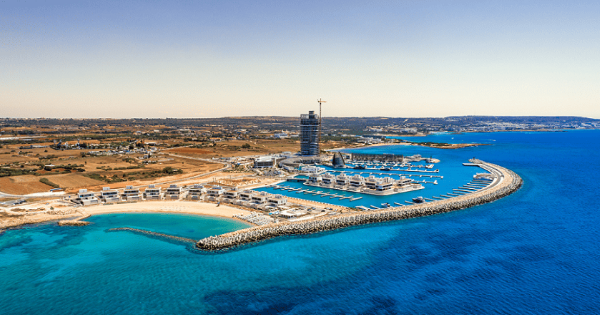An efficient and integrated maritime hub, Cyprus is among the largest shipmanagement centres in the world and the largest in Europe. A global success story for decades, the island’s shipping industry has continued to stay focused and strong in the face of unprecedented challenges to global shipping.
Shipping is historically one of the most successful industries in Cyprus. The vibrant and resilient sector is the longest-serving generator of foreign direct investment and is primed for further growth. Cyprus has the third largest merchant fleet in Europe and the 11th largest in the world, the country is also the EU’s largest third-party shipmanagement centre and amongst the top three in the world. With a sovereign flag of excellent quality, the country has become a preferred base for global shipping operations and of the more than 250 shipping-related companies present in Cyprus today some are the largest of their kind in the world. For a small island nation, the figures are impressive with more than 5% of the world’s fleet controlled from Cyprus and more than 20% of the world’s third-party shipmanagement activity is managed by companies based in Cyprus. With a maritime history spanning thousands of years, today shipping stands as one of the most significant and financially strong pillars of the Cyprus economy.
Thriving Shipping Cluster
The country’s maritime industry contributes more than €1 billion to the economy annually, which equates to over 7% of GDP, a far higher figure than in other countries engaged in merchant shipping. Of this figure, shipmanagement alone accounts for around 5%. Cyprus has a large resident shipping industry with over 250 companies based on the island covering the full range of shipping activities and related services. Foreign companies with a physical presence in Cyprus, particularly from Germany, Greece, Switzerland, Malta, and Singapore, contribute significantly. Notably, these contribution rates are expected to persist in 2024. Large shipping companies dominate, contributing 94% of the industry's revenues in H1 2023, with shipmanagement firms representing 46% of total ship revenues. More than 55,000 seafarers are employed on Cyprus ships and about 9,000 people are employed by shipping companies based in Cyprus.
The country’s Shipping Deputy Ministry was established in 2018, implementing new supportive measures and flexible mechanisms to upgrade Cyprus’ status as one of the most formidable maritime centres worldwide. A good example was the reapproval of the specialised Cyprus Shipping Taxation System by the European Union, which was also unanimously approved locally by the House plenum in 2020. This ensures the sustainability of the country’s shipping industry for the next decade – a factor crucial for the Cyprus economy. Cyprus has also cemented its position on the Paris and Tokyo MoU ‘white lists’ in relation to the safety performance of flag administrations. In 2023, Cyprus jumped from 13th place to 8th on the Paris MoU list, fortifying its status as one of the world’s most trustworthy flags.
There are many factors which have contributed to the steady growth of shipping in Cyprus. The island’s strategic location at the crossroads of three continents – Europe, Africa and Asia – has played a prominent role in the success of Cyprus as a major international centre as it provides easy access to markets and the ideal time zone for international operations. This coupled with the low operating costs has prompted many companies to set up fully fledged offices on the island.
Cyprus also combines a simple and effective regulatory structure where English is widely spoken by its highly skilled and specialised workforce, and excellent banking and telecommunication systems. Several fiscal and economic advantages are also available such as the aforementioned tonnage tax system, zero registration fees and exemption from income tax of seafarers on board Cyprus ships. In addition, the full protection afforded to financiers and mortgage lenders, and the 24/7 service, all constitute a competitive and attractive framework of advantages and services offered by the Cyprus maritime administration.
The launch of a one-stop-shipping centre in 2023 was a key milestone in streamlining the services of the maritime administration. Cyprus also intends to proceed with the implementation of the Shipping Limited Liability Company Law in 2024, following the recent completion of the secondary legislation, which will simplify the procedures and operating regime of Cyprus shipping companies that own Cyprus ships and increase the competitiveness of Cyprus shipping.
The cluster has continued to grow, underlining the local industry’s enhanced competitiveness, stability, and growth opportunities. The number of Cyprus-based companies has grown by over 30% over the last few years. A prime example of this was the arrival of a new P&I Club, Steamship Mutual Underwriting Association (Europe) Limited, which decided to underwrite all its European business through its Cypriot entity. Also, British shipping firm P&O Ferries decided to register its English Channel operating fleet under the Cyprus flag to take advantage of the benefits and security it provides.
Strong Local Support
A seafaring nation since antiquity, Cyprus began building its modern shipping industry in the early 1960s when it established its shipping registry and introduced legislation providing ship managers and owners with a competitive tax environment. Among the country’s other evident advantages are its strategic location at the crossroads of maritime transport lines between East and West, its proximity to the Suez Canal, low operating costs, a highly educated, multilingual workforce and its sophisticated professional services industry.
The formidable Cyprus shipping industry has flourished without any state investment, although it enjoys strong state support. Cyprus’ two dynamic shipping associations – the Cyprus Shipping Chamber (CSC) and the Cyprus Union of Shipowners (CUS) – work closely with the state to constantly upgrade the maritime administration and to build up its competitive offering. The creation of a new and independent Shipping Deputy Ministry in 2018 made the sector even more efficient, autonomous, and business focused. The timing of the launch allowed Cyprus to capitalise on new opportunities for the sector from a developing natural gas sector and Brexit.
Limassol, the country’s maritime capital, has undergone a major transformation in recent years. Bustling cafes and restaurants fill its revamped historic old town while its long coastal road is now flanked by cycle paths, pedestrian walkways, and prestigious, high-rise residential developments. Foreign shipmanagement executives enjoy the renowned holiday country’s pleasant lifestyle and its safe and family-friendly environment, with the added bonus of tax incentives for high-earning expats.
Competitive Tonnage Tax
A major driver of the shipping sector’s success was put in place in 2010 when, after more than 10 years of negotiations with Brussels, Cyprus secured an agreement for an upgraded and competitive EU-approved tonnage tax (TT) system. In 2020, this agreement was reapproved by the EU, and unanimously approved by the House plenum, ensuring the stability of the tax framework until 2030 and maintaining Cyprus’ prominent position in the shipping arena both on a European and international level.
The main benefit of the TT regime is the certainty it provides companies on their annual tax obligations, enabling them to do their business planning accordingly. The system has attracted scores of companies over the years, with the number tripling in the past decade. In 2012, there were 97 companies enrolled in the TT system, which rose to 275 in 2021. Currently, the number of shipping companies that are part of the TT system exceeds 350. While other jurisdictions might have less expensive TT regimes, Cyprus’ incorporates all three types of maritime activities – ship owning, shipmanagement and chartering, making it unique in the EU where other jurisdictions might specialise in just one or two of these areas.
Additionally, Cyprus is offering green incentives to ship owners and operators to reward vessels that demonstrate effective emissions reductions. As of 2021, annual TT is reduced by up to 30% for each vessel that demonstrates proactive measures to reduce its environmental impact by using alternative fuels, such as biofuels and hydrogen, ensuring ship owners are rewarded for sustainable shipping efforts.
Opportunities and Challenges
Shipping has faced many unprecedented challenges in the last few years. Undoubtedly, the Covid pandemic and the war in Ukraine followed by the sanctions imposed on Russia have impacted shipping and seaborne trade, especially with respect to dry bulk and tanker shipments. This has negatively affected the shipping industry worldwide leading to changes in shipping patterns and has increased the distances travelled for commodities, especially oil and grain, with a consequential impact to the environment. In addition, the more recent war in Gaza has caused further disruptions in transportation routes through the Suez Canal with tensions rising in the Red Sea resulting in attacks on cargo vessels.
However, the biggest trends that are already impacting the sector are rapid tech development, environmental challenges, dealing with decarbonisation and finding alternative fuel options to power global shipping in the future. Ship owners are also facing a predicament of whether to buy ships at this point, when in less than 10 years the tech and other spec requirements could be completely different – making it a costly and perhaps redundant investment.
The next five years will be most exciting in terms of satellite communication developments and disruptive tech being introduced to improve safety and efficiency in the industry. Much of core tech being used by shipping companies will be replaced by new smart tech, such as smart weather foresight, smart performance analytics and report alarms. Digitalisation is key to staying competitive, but industry experts say tech and AI will not replace humans anytime soon.
Speaking of the human element, shipping executives have voiced concerns that finding competent crew is a growing problem worldwide. It is increasingly difficult to attract young people of high calibre and ambition to choose a career at sea. Seafarers are both the heart and soul as well as the Achilles heel of the industry, and companies are acutely aware that all the tech in the world will never replace a well-trained and experienced crew. Shipmanagement giants such as Columbia Marlow have highlighted the industry’s need for more care and support of crew members whether on- or off-shore, to introduce more perks and better training opportunities and to create a safer working environment.
Fintech is also set to bring new ways to raise capital in shipping and introduce better ways of risk profiling for both investors and investments, and growing ship financing possibilities available through Cyprus banks will support the future growth and diversification of the sector.
One improvement that shipping executives have been calling for to help Cyprus strengthen its maritime centre is to improve flight connectivity and establish more direct flights to other key hubs around the world. One historical challenge of significant impact remains for Cyprus: the size of the world fleet has doubled over the last two decades, but currently the Cyprus industry is prevented from realising its true potential by the Turkish embargo, which was unilaterally imposed in 1987 on Cyprus-flagged ships calling at Turkish ports. A settlement of the so-called ‘Cyprus Problem’ would immediately resolve this and dramatically boost the size of the country’s commercial fleet. Pending a settlement, Cypriot officials continue to press for the lifting of the Turkish embargo to be included in any package of confidence-building measures in reunification talks.
Foundations for a Favourable Future
With its growing registry and reformed procedures Cyprus’ shipping sector punches well above its weight, standing tall as an EU jurisdiction and maritime centre that has proven it can expertly navigate through market fluctuations and evolve with new tech coming on stream. The country’s key focus is to continue enhancing the competitiveness and safety of Cyprus shipping and to attract more companies to its shores, and to promote of maritime studies and so-called blue professions to ensure it has a skilled workforce to keep building and supporting the industry. Ultimately, Cyprus is determined to maintain the excellence and quality of the Cyprus flag, which despite the difficulties and challenges it faces, continues to be considered as one of the most competitive flags worldwide.
February 2024
For more information, contact Cyprus' investment promotion agency, Invest Cyprus.
All rights reserved. The material on this site may not be reproduced, distributed, transmitted, cached, or otherwise used, except with the prior written permission of The Profiler Group.
















